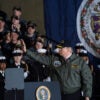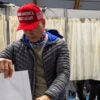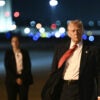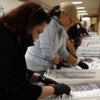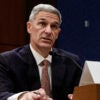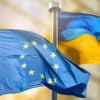
When the United States and Russia meet in Prague on April 8 to sign the follow-on Strategic Arms Reduction Treaty (START), Presidents Obama and Medvedev will finalize a process that took about a year to complete. Although some claim New START is a monumental step along the “road to zero” (a world without nuclear weapons), a look back at the rocky negotiation process reveals that serious national interests were sacrificed in the interests of this idealistic goal:
- On February 7, 2009, Vice President Joe Biden promised that the U.S. would “press the reset button” with Moscow during an international security conference in Munich.
- Secretary of State Hillary Clinton followed this speech by presenting Russian foreign minister Sergei Lavrov with a physical reset button meant to symbolize the improved relationship.
- Presidents Obama and Medvedev first met on April 1, 2009, in London, where they released a joint statement on their intentions to renew the START agreement and “move further along the path of reducing and limiting strategic offensive arms.”
- Within the week, Obama traveled to Prague to announce his ambitious plan to rid the world of nuclear weapons. At the time, Heritage Fellow Baker Spring pointed out the president’s contradictory goals of maintaining an effective nuclear arsenal while acceding to the Comprehensive Test Ban Treaty.
- The U.S. and Russia began formal negotiations on the START follow-on agreement on May 19, 2009.
- From July 6-8, 2009, Obama met with Medvedev in Russia, where the two leaders agreed to reduce their strategic warheads to between 1,500 and 1,675 and their strategic delivery systems to a range of 500-1100 each.
- Reportedly, both countries discussed the “third site” missile defense system to be deployed by the U.S. in Poland and the Czech Republic at this meeting. Russia adamantly opposed the plan and tied the European missile defense to arms control negotiations.
- In late August, Polish media sources reported that Obama had abandoned these missile defense plans.
- On September 17, the U.S. officially cancelled the “third site” option, appeasing Russian interests to push through with START negotiations and abandoning commitments made to important American allies. According to a Heritage Foundation Factsheet, this decision was “a strategic victory for the Kremlin, which is determined to have a sphere of privileged interest in its region.”
- However, on October 9 the President was rewarded for his nonproliferation efforts when it was announced that he would receive the Nobel Peace Prize.
- The surprising decision did not guarantee success in START follow-on negotiations. On December 4, Obama and Medvedev released a joint statement committing both nations to continue working towards a successor treaty following the official expiration of START I the next day.
- In January 2010, the Obama Administration thought it had completed the agreement, but it later found out the Medvedev still refused to budge on linking missile defense to arms control. Moscow got Obama to back down on the “third site” option, so the Kremlin continued to push him on other missile defense options in Europe throughout February.
- When the president announced the completion of START negotiations last week, he emphasized that the agreement puts no limits on American missile defense systems. However, a non-binding perambulatory statement from Moscow states their right to withdraw if Russian interests are threatened by U.S. missile defense systems.
The Daily Signal depends on the support of readers like you. Donate now
While many herald the finalization of the START follow-on agreement as a vindication of the Obama’s arms control strategy, a reminder of this year-long process raises questions about American national security. Were the sacrifices related to missile defense, American alliances, and nuclear modernization worth it? These more immediate and urgent strategic interests should not be clouded by the idealism of a world without nuclear weapons.
Jeffrey Chatterton currently is a member of the Young Leaders Program at the Heritage Foundation. For more information on interning at Heritage, please visit: http://www.heritage.org/About/Internships-Young-Leaders/The-Heritage-Foundation-Internship-Program


